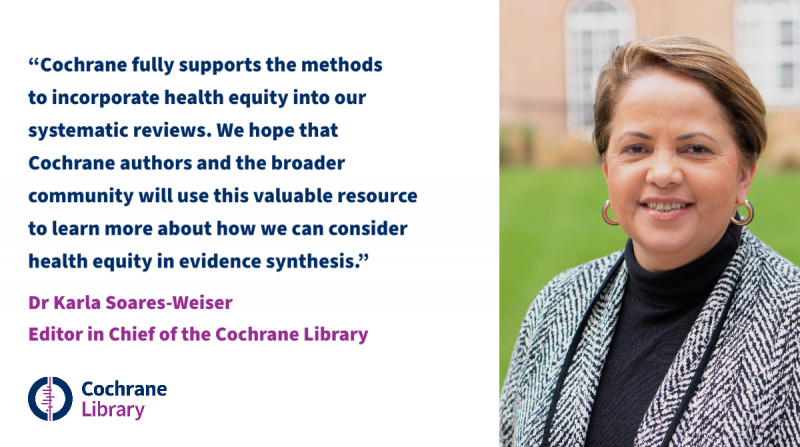
Cochrane is pleased to announce the release of a new, eleventh module of the Cochrane Interactive Learning course on Health equity in systematic reviews.
In it, users will learn about health equity, which is the absence of avoidable and unfair differences in health outcomes among groups, and how and when health equity can be incorporated in all steps of the systematic review process. The module also addresses how health equity should be considered in planning aspects of knowledge translation.
Improving health equity is an important goal and is recognized as a priority by the WHO and many other international organizations. Systematic reviews that incorporate health equity can help policymakers assess how interventions work for different population groups. Cochrane is committed to promoting the consideration of health equity in evidence synthesis, and the new Cochrane Handbook for Systematic Reviews of Interventions has a full chapter dedicated to this subject.

Karla Soares-Weiser, Editor-in-Chief of the Cochrane Library, says of the module, “We are delighted to present this new module on health equity in systematic reviews. Cochrane fully supports the methods to incorporate health equity into our systematic reviews. We hope that Cochrane authors and the broader community will use this valuable resource to learn more about how we can consider health equity in evidence synthesis.”
The eleventh module of the Cochrane Interactive Learning Course was developed by a partnership between members of the Campbell and Cochrane Equity Methods Group, the Learning Team in Cochrane’s People Services Department and world-leading e-learning designers.
With this module, Cochrane continues our commitment to providing high quality, engaging, and innovative distance learning. Some Cochrane contributors and residents of HINARI countries may access the new module (and the entire Cochrane Interactive Learning course) for free, and subscription options are available for individuals and institutions. To find out more and access the new module, please visit this page.

